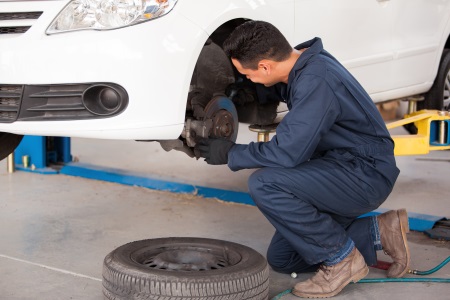Brakes: How They Work & Why Maintenance is Essential
Your brakes are the most important system in your car, and the main safety element to protect you and your passengers. While your tires and engine can help your vehicle go, your brakes are what bring your car or truck to a stop – and that’s why they deserve your attention.
We rely highly on our brakes on a daily basis, and yet they are often taken for granted. Don’t neglect your brakes any longer; learn more about your vehicle’s brake parts and why brake maintenance is important right here!
The Parts & Operation of Your Brakes
Your vehicle has several brakes – service brakes, anti-lock brakes, and emergency brakes. These all play a key role in your vehicle’s safety and control on the road. Let’s focus on service brakes. Your car or truck either has disc brakes or drum brakes. Modern vehicles most often rely on a disc brake system. Disc brakes consist of a metal rotor, caliper (hydraulic clamp), and disc brake pads. Stepping on your brake pedal sends brake fluid to the caliper which triggers it to clamp; putting pressure on the brake pads and bring your vehicle to a stop.
Each of these parts will wear with time – and Wisconsin road conditions and weather often mean they wear faster. It’s important to have them inspected regularly to catch problems early.

Brake Inspection & Maintenance
Replacing the pads, inspecting the rotors, and keeping the master cylinder filled with the correct level of fluid for the brakes to operate properly is the easiest way to keep up with brake maintenance. The brake fluid should be filled and free of debris to prevent any slip and malfunction of the braking system. The owner’s manual will specify what your exact maintenance schedule should be. However, a good rule of thumb is to inspect your brake system for wear with every other oil change (approximately 10,000 miles).
At Dave’s American Discount Muffler in Kenosha, we can help you keep up with your brake maintenance schedule to ensure the safety of you, your passengers, and your vehicle.

